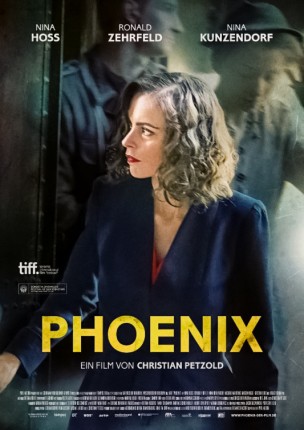Perhaps unsurprisingly, German film has long been reluctant to portray the events of the Second World War. Even recent films such as “Downfall,” which is famous in Germany for portraying Hitler’s final hours, merely tangentially mentions the horrors of the Holocaust. This is not out of ignorance. There are perhaps insurmountable challenges, particularly in Germany, in portraying one of the greatest atrocities in history.
But director Christian Petzold has always enjoyed a challenge. He takes a different route to examining the scars of German history. “Phoenix,” his latest film, is a melodrama that begins as the war ends. Nina Hoss, a woefully underappreciated actress, gives her strongest performance to date as Nelly, a survivor of an concentration camp. Nursed to health by her old friend, Lene (Nina Kunzendorf), Nelly undergoes extensive reconstructive surgery. Despite Lene’s protests, Nelly becomes obsessed with finding her lost husband. We follow her being lost (literally and figuratively) amongst the ruins of Berlin, unsure of where to turn. Nelly desires to return to her previous life, while Lene urges her to come to the new Jewish state. As Nelly looks to the past and Lene looks to the future, neither can quite grasp the solace they seek. The first third of the film is the most uneven, hitting powerful notes but also struggling to find its footing–but once the plot begins in earnest, “Phoenix” never ceases to amaze.
Eventually Nelly finds her husband, Johnny (Ronald Zehrfeld), who no longer recognizes her. The rest of the movie unfolds as a warped, claustrophobic version of “Vertigo.” Nelly pretends to be a stranger as Johnny asks her to impersonate his wife to claim her fortune. As Nelly’s impersonation of an impersonation deepens, she begins to greater resemble herself from a happier time. Her demeanor brightens, her costumes become more elaborate, and she grows from meekness to confidence.
Music is Nelly’s one unbreakable link to her earlier life. As a singer, she holds the art form near and dear to her heart, as does Petzold. Song is his most useful tool to convey emotion, and any sequence with it is both fascinating and heartwrenching. Composer Stefan Will bases his score off of the song “Speak Low.” Reflecting the film, it’s a minimalist soundtrack, often expressed with a piano and guitar alone.
And the silence is just as powerful. Hoss’s trepidation as she walks through the trees and ruins speaks volumes. Kunzendorf’s pain and Zerfield’s desire dominate the frames they inhabit. Wide shots of the night cityscape and intense closeups are just as impressive.
As the movie progresses, the audience feels increasingly claustrophobic. Much of the second half takes place in a small, confining basement. We have no choice but to become acutely aware of Nelly’s turmoil, and Nina Hoss brilliantly conveys her agony, fear, and unyielding determination. This is her fifth collaboration with Petzold, and by far her best. Petzold always gives her minimal dialogue and lets Hoss’s expression do the talking. We are never sure of her character’s true thoughts until the very end. Nelly unfolds to us as the plot does.
Christian Petzold has often been obsessed with transportation motifs. Here he uses them to a more powerful effect than before. The intermittent, quiet train whistles in the background are horrifying, haunting reminders of the past. And “Phoenix” follows the director/co-writer’s usual structure: a mysterious protagonist, in need of funds, is encouraged to take up an unusual job. They become lost in it, and by the end are either made or destroyed by it. The difference with “Phoenix” is how personal that plot is. Nelly’s job involves her finding herself again, and it also reflects the Holocaust’s aftermath after so many and so much has been lost.
“Phoenix” is an astounding achievement. It moves through its plot slowly but confidently, taking its time to linger in the melodrama. Each beat feels surprising yet inevitable, and moves ever closer to a top contender for the strongest ending of the year. It is a rare film where the audience is left breathless by its final moments, in awe of what just transpired. The film uses the Holocaust as a backdrop more than as a focus, but that in no way means it shies away from the atrocities. It asks what happened to Germany and its occupants in the wake of so much destruction, for victims and sympathizers alike. The answers it finds are ugly, painful, and immensely human. Petzold tells a simple story amidst an immense history, and within their interplay brings forth a remarkable work.
